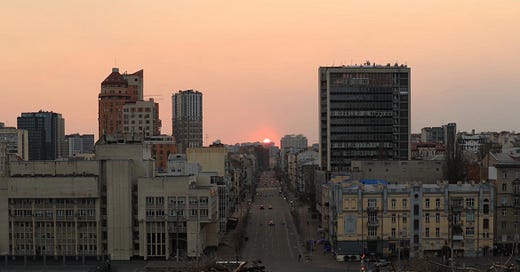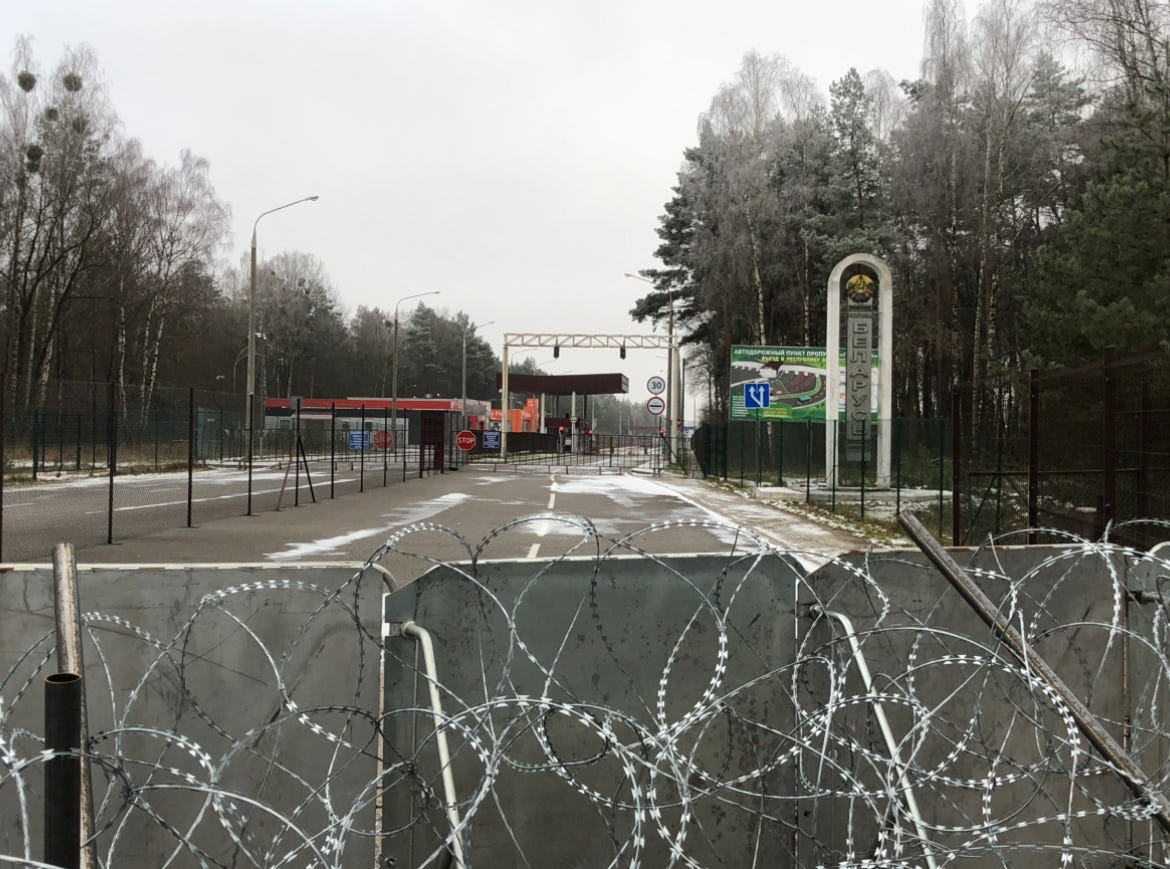Life, Journalism, and the Burden of History: The Story of My Marriage to Eastern Europe
An (overly grandiose) essay on why I do this work
A bit of an unusual, personal post from me on this eventful Sunday. I’m hoping this will add context to this newsletter, and give you a better sense of who I am. Enjoy:
It’s a common trope that journalists never write about themselves. We’re taught that we’re supposed to report the story, not become it. But as I sit today in Warsaw, passing the time until the results of one of the most consequential presidential elections in Poland’s modern history are announced, it occurs to me that I’ve always been there in the stories I’ve written — I just never noticed it. As this region has transformed over the last twenty years, I’ve transformed with it, becoming willfully ensnared by the epoch-defining events that have come to shape my journalistic life. The more unstable and perilous the future of Eastern Europe has become, the deeper my roots here have grown, and the more intertwined my own fate has become with this part of the world. And now that Eastern Europe, and Poland itself, is at the center of so many events of global importance, not least this election, I’ve come to understand that writing about this region will be my life’s work — and in hindsight, it was always destined to be.
In times like these, it’s easy to forget that Eastern Europe used to be a place where nothing happened. For decades since the end of the Yugoslav Wars in the 1990s, which breathed their last dramatic breath in Kosovo in 1999, this region had existed in a kind of post-historical limbo, where nothing seemed able to stop the inevitable forward march of progress, democracy, and re-integration into the Western order after the communist years.
This was the Eastern Europe I grew up with. Having been born in the US to Polish immigrant parents, I spent nearly every other summer in my younger years in Warsaw with my grandparents and extended family, existing in a place that no one back home in the US seemed to know or care about. Although it was frustrating to explain to Americans that people in Poland didn’t speak Russian or that Poland wasn’t a frozen Siberian hellscape, there was a comfort in that obscurity. At the same time, it felt like the entire region was at my fingertips — my family and I took roadtrips from Warsaw to Lithuania, Ukraine, Slovakia, and even Bosnia, without so much as batting an eye at the silent turbulence of the region that, for us, felt like the distant past.
The truth of course was that this past was not so distant at all, and was hardly dead and buried — it merely lay dormant, conspiring to burst out of its shallow grave when the time was right. The first warning sign that things were changing happened in a corner of Eastern Europe that some Europeans barely considered a part of Europe at all. I was in Warsaw when Russia invaded Georgia in August 2008, and even at 14 years old, I remember being struck by the seeming anachronism of it all. Did things like this really happen anymore? Was history on the move once again?
Of course, the shock of the invasion quickly dissipated — after 16 days of war, a ceasefire was reached, and the world swept the whole affair under the rug. Yet of course, the writing was on the wall for all who cared to read it. After the Euromaidan Revolution in Ukraine six years later, when Ukrainians overthrew pro-Russian President Yanukovych, Russia proved to Eastern Europeans that Georgia was not a one-off event. The bloodless seizure of Crimea and the start of the War in the Donbas marked a new phase in Russia’s resurgence as an imperial power in Eastern Europe, although few in the West recognized it for what it was at the time. Not only that, but something else was shifting in Eastern Europe — Right-wing populism was on the rise, first in Hungary with Viktor Orbán’s return to power in 2010, but soon also in Serbia, Poland, and beyond. With Donald Trump’s election in the US in 2016, I felt politically stateless; neither of the countries I belonged to had governments that I felt represented me.
But it wasn’t until 2021 that the demons of Eastern Europe reached up from the blood-soaked earth and grabbed me by my ankles. Having brutally cracked down against his domestic political opposition, Putin-backed Belarusian dictator Alexander Lukashenko turned his attention to Poland and the Baltic states, luring desperate migrants to the frontier of the EU and forcing them to brave the horrors of the wild borderlands in a form of hybrid warfare against the West. The new imperialism of the Russian world had suddenly collided with the rising tide of Eastern Europe’s nationalist wave, and Poland’s populist leaders responded to the crisis by militarizing the border area, building a border wall, and using force to keep migrants off Polish soil.
For the first time, Poland mattered in international news — journalists flocked to the Polish-Belarusian border, European leaders rallied around Poland’s plight, while immigrant rights groups decried the treatment that migrants, instrumentalized by forces much greater than themselves, were receiving at the hands of the Polish Border Guard. It didn’t take long for me to get wrapped up in the chaos myself — although I had previously been focused on covering the Middle East, going to Poland felt like the obvious move. At the time, I told myself I was doing it because the people crossing the forests and swamps of the border zone were Syrians, Afghans, and others from my area of coverage, but there was always a part of me that felt a sense of duty to a place I had always considered my second home. Over the course of two weeks in Poland’s northeast, I became the first English-language journalist to gain entry into the military exclusion zone along the border, documented the experiences of migrants who made it through the forested borderlands, and covered how locals were helping refugees survive in the frigid woodlands at great risk to their safety. Surreally, my little corner of the world had now become a frontline in an emerging shadow conflict between NATO and Russia, and I knew this was only the beginning.
Less than six months later of course, I was proven right when the floodgates burst wide open and Russia launched its full-scale invasion of Ukraine. Overnight, Eastern Europe changed forever — scenes that had once only been associated with Syria or Iraq arrived in shocking fashion on Europe’s doorstep, and the liberal, internationalist house of cards the world had built suddenly came crashing down. Poland was NATO’s frontline of not just a shadow war, but the largest land war in Europe since 1945. And as the skeletons in Eastern Europe’s closet roared back to life, they pulled me even deeper into the depths of the region’s eternally repeating prison of history. In March 2022, my photographer friend and I, along with a handful of other journalists, found ourselves the only guests at a hotel in central Kyiv, watching air defense systems shoot down incoming missiles while black smoke from artillery strikes billowed from the city’s outskirts where Russian forces were trying to encircle the Ukrainian capital. Once Putin’s army retreated from Kyiv, we photographed mass graves in Bucha, saw the bodies of civilians who were shot down where they stood, and looked into the eyes of survivors whose shock at what they had lived through still masked their grief. This was the true face of the Eastern European experience — the previous twenty years had been little more than a façade.
Three years later, the War in Ukraine is in its fourth year, familiar nationalists, this time in Trumpian clothes, are in power or knocking at the door in countries from Georgia to Poland, and the old ghosts of the Yugoslav Wars are rearing their heads again in Bosnia and Kosovo. It is clearer now than ever before that I and every other Pole, Ukrainian, Hungarian, or Georgian had been deluding ourselves for decades into believing that our collective past, with Russia and with ourselves, hadn’t simply been on hold, waiting for the right moment to hit play.
Despite all the suffering, the uncertainty, and the impending sense of doom that dominates Eastern Europe these days, as a student of history, I feel a certain awe when watching all of this unfold around me. Part of it is a kind of wonder that comes from bearing witness to such world-altering events, but a big part of it also comes from the sense that I am playing a role, however minuscule, in something much greater than myself. Eastern Europe’s journey from a place apart, whose future once seemed mundanely linear, to an axis around which international events have started to turn has swept me up and never put me down. I too have become a prisoner to the grand cycles of its past.
For all these reasons, my work in this newsletter and beyond remains incredibly personal — shining a light on Eastern Europe and documenting the epoch-defining developments happening here is my way of dancing with the times, of reckoning with things which I will never be able to escape.
I’m glad to have you all along for the ride. Thank you for reading, and I hope you will continue to stay engaged.








Great text. Being from Finland, I totally understand the thinking that nothing happened in Eastern Europe. Until now.
But now it is horrible and menacing. Not only the r&ssian aggression, but also the disinformation aimed at stigmatising normal people, making them more prone to autocratic power, is scary at least.
Happy to hear about your commitment to this area of the world
Thank you, Michal. A very personal and touching article. I am glad to have found your resource. I have also enjoyed your new article on UnHerd. Reciprocally, you might want to check my account of the history of Belarus, for the contextual awareness: https://medium.com/@lqueroli Looking forward to reading more from you.